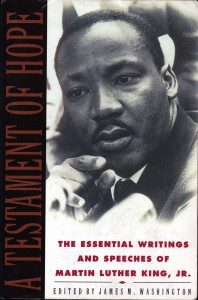 This week marks the 50th anniversary of the iconic “I Have a Dream” speech, delivered by Dr. Martin Luther King, Jr. on the steps of the Lincoln Memorial during the historic March on Washington.
This week marks the 50th anniversary of the iconic “I Have a Dream” speech, delivered by Dr. Martin Luther King, Jr. on the steps of the Lincoln Memorial during the historic March on Washington.
While deep in the trenches of the fight for civil rights, Dr. King’s famous speech was a rallying cry for those who, oppressed in their own land, needed a reminder of how great a potential their nation held, and how high of a calling they had in helping that nation meet this potential.
It served as a reminder that hate only begets hate, and that one must “meet physical force with soul force.” It promised that somehow, some way, the situation would be changed. It reminded activists not to “wallow in the valley of despair,” but instead, continue to work “until justice rolls down like waters and righteousness like a mighty stream.”
It laid out a dream for our nation, and turned out to be the turning point in making that dream a reality.
Until we no longer have places in this country that hold separate “Black proms” and “White proms,” until there is no longer a box for race when filling out forms, until we realize that we are all a part of the human race, King’s dream will not have fully come to fruition.
In the ensuing years however, our nation has made great strides towards this goal of equality. Today, racially mixed couples can safely go about their business. Today, there are no longer separate water fountains, bathrooms and lunch counters. And, this week, an African American president stood on those same steps in Washington and delivered a speech commemorating the occasion – proof positive that Martin’s dream is alive and well.
Those wishing to further explore Dr. King’s teachings should read “A Testament of Hope: The Essential Writings and Speeches of Martin Luther King, Jr.” by Martin Luther King, Jr. and James M. Washington.
King, Jr. and James M. Washington.
A collection of King’s writings, speeches, interviews, and reflections, this volume contains his groundbreaking thoughts on non-violence, social policy, integration, and the ethics of love and hope.
They are the beliefs of a great man, shared in his own words.
In a testament to the continuing relevance of King’s philosophies, one reviewer commented that, “So much of what King said isn’t limited to the movements of 50 years ago, but to the ongoing struggle for human dignity and equality.”
Another said, “I particularly appreciated the notion that civil rights was really about global rights on a human scale.”
As long as we endeavor to see equal rights conveyed to all in our great nation, and indeed, the world, King’s words will continue to carry significant weight.
I still dream of the day that all people will be judged solely by the content of their character. I dream of the day we will reach the place where all are able to enjoy the fullness of their God-given rights. I dream that at last, race, religion, creed, and preference will be an afterthought rather than a determining factor.
I share King’s closing sentiment, which rings as true today as it did fifty years ago:
“When we allow freedom to ring, when we let it ring from every village and every hamlet, from every state and every city, we will be able to speed up that day when all of God’s children, black men and white men, Jews and Gentiles, Protestants and Catholics, will be able to join hands and sing in the words of the old Negro spiritual, “Free at last! Free at last! Thank God Almighty, we are free at last!”
Edie Crabtree is an avid reader and the mother of three active boys. She can be reached at crabmom3@gmail.com.





Edie,
Would like to follow more of your posts (subscription). What day do your post and what are publication times. Strange we’ve both been in Newspaper publishing.
Aunt Lynne
Hi Lynne: The NB Indy comes out on Fridays, and we try to have the Under Cover column posted to our website by that weekend.